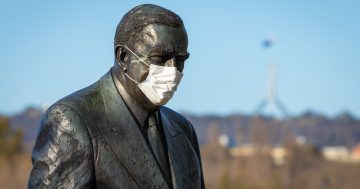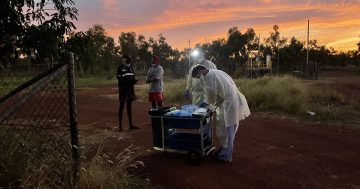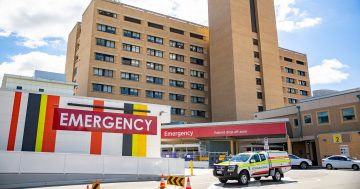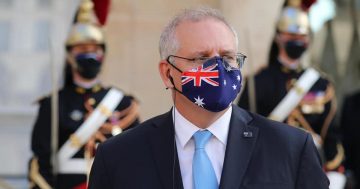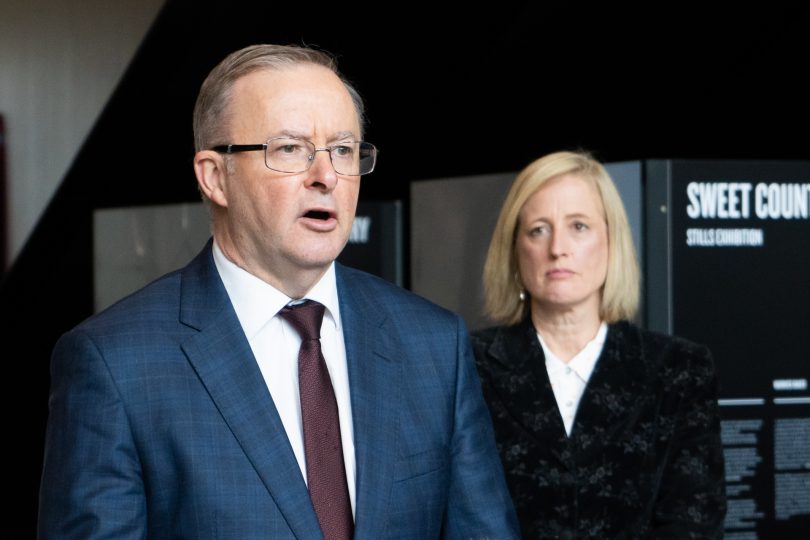
Prime Minister Anthony Albanese and Finance Minister Senator Katy Gallagher: economy first. Photo: Region.
Despite the Federal Government relenting on pandemic payments for casual workers, a return to the measures of previous waves of COVID-19 is unlikely.
The winter wave of subvariants is wreaking havoc with the staffing of services and businesses and threatens to overwhelm already stretched hospitals.
And, yes, people are falling seriously ill and some are dying.
Does this mean a return to mandates and social restrictions are back on the agenda?
They may rate a mention in cabinet meetings – state territory or national – but don’t expect it.
Whatever the health advice, governments have shot their bolt and an exhausted people won’t tolerate the resurrection of mandates, lockdowns or travel restrictions.
The Albanese Government did the right and fair thing by restoring the payment to casual workers forced to isolate until September to get the country through winter, but facing a budget that will bleed rivers of red, it knows it has to start holding the line.
What is happening today is essentially a repeat of the first two years of the pandemic, only now we have open borders, no mask mandates or social restrictions.
The new variants are highly infectious, dangerous and deadly.
But there is an unspoken consensus that the nation can’t go back, that we can’t afford the economic, emotional and spiritual cost of shutting down again.
So the emphasis is on education – get your booster, wash and sanitise your hands, and wear a mask, but the state isn’t going enforce these things or penalise you for not doing them.
It is an acknowledgment that in 2022 the state simply doesn’t have the will or the legitimacy it requires to do it.
All governments face massive budget deficits in a time of rampant inflation, rising interest rates (even though the risk is that a credit squeeze will only kill the economy) and deteriorating confidence.
The public service may underpin the ACT economy, but that is a strength and a weakness, something the ACT Government has assiduously tried to remedy by nurturing the higher education and tourism sectors, both devastated by the pandemic.
With travellers and international students returning, the last thing Chief Minister Andrew Barr will want is another shutdown that will choke off whatever sliver of recovery is emerging in those sectors.
Canberra Airport is only just getting back on its feet, announcing new routes and that Qatar Airways will resume its international services, followed hopefully by Singapore Airlines.
Canberra Airport CEO Stephen Byron’s nightmare is the return of any travel restrictions or even the mask mandate.
The ACT, like other jurisdictions, is also facing a skills shortage due to the country’s isolation and suspension of migration.
The low jobless rate reflects how much Australia has relied on migrants and students to fill jobs and ignored the training needed to maintain the economy.
The new government is committed to doing something about training and education, but it acknowledges that Australia needs skilled migrants in the short term.
So it will want a free hand to manage that.
The other trend has been a new emphasis on actual treatment, including the use of antivirals rather than expecting that a vaccine can protect us, given the rhetoric around their ever-changing role and efficacy.
Indeed, by the time new vaccines arrive to deal with the subvariants, the virus, as is its wont, will probably have moved on again.
When it comes to viruses, health policy must look beyond the silver bullet approach of vaccines and throw more resources into public health to deal with the physical conditions in which sickness emerges, including poor ventilation and lack of sunshine and winter heating.
It also cannot ignore the poor diets and lack of exercise behind the underlying conditions such as obesity and diabetes that make people so vulnerable.
Government leaders face tough choices. Whatever decisions they make, they fear the pain of another economic meltdown is going to outweigh the risks of this third wave of the virus.
There may be some measures to manage it, but the onus will continue to be on people to do the right thing and follow the health advice.
So what can be expected is a new education drive to mask up, wash and sanitise, and make careful choices about where you go as we ride this one out.
Businesses such as supermarkets should refill their sanitiser bottles and put out the wipes.
But for governments, there is no turning back.












